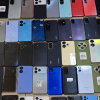
When the news broke recently about the shooting to death by police of an unarmed 18-year-old black youth in Ferguson, Missouri, in the United States, I couldn’t help but think back to the time I spent in another state in that country, which I had believed was a place where everything and everyone was perfect.
I moved to the US in 2000 when I was almost 12. When I first learned I was going to join my mother in Georgia, I experienced mixed emotions. I was happy to know that I would be seeing a new place and also nervous because I didn’t know what to expect once I got there.
Growing up in Kenya and from the things I had seen on TV made America seem like the best place to live, and I was raised to love all and see no colour because God created us all in his image.
Facing my first day at Burney-Harris Middle School in Clarke County, northeastern Georgia, my stomach was filled with so many butterflies, and I remember my mother reassuring me over and over that I would do fine.
SMALL TOWN
From the moment I boarded the school bus, I was greeted with a mixture of looks from the other students. As I made my way to a seat, I realised some of them were asking each other who I was. Athens, in Clarke County where the school is located, is a small town, and many of the people know each other.
One student came up to me as we were alighting from the bus and asked what my name was. When I replied with a shaky voice, she noticed my accent and asked if I was from African to which I replied yes. I made my way to my first class and found the teacher setting up.
As she was calling out names on the register, she got to mine and made an attempt that didn’t sound anything like my surname, so I didn’t answer. Afterwards she asked to see my schedule, looked at it, gave it back and asked if I spoke English. I said yes. Then she got mad and wrote me a disciplinary note for not following instructions in the classroom.
The other students didn’t make it any easier for me on that first day of school in a southern US state where the Confederate Army had fought bitter Civil War battles to preserve slavery.
By lunchtime, I had been asked all types of questions about Africans and what we were like. How does it feel to have clothes and shoes for the first time in your life? Do you have a lion or a cheetah as a pet? Did you run from your home in Africa to school this morning?
Some of the questions were humiliating and made me feel less of a human being. And if it was not the questions, they would make rude gestures or noises trying to imitate Africans from what they had seen on TV. On that day I was both shocked and embarrassed, mainly because some of the abuse was coming from African-Americans in the school.
I switched schools and joined Oconee County High School in the next county where 88 per cent of the population was white and five per cent were African-American and Africans. The school was, therefore, predominantly white.
On my first day there I realised how segregated the students were — all the black students would sit together before, during and after classes. Even though for the first time black students didn’t abuse me, as a Kenyan I still felt somewhat an outcast.
GOOD JOB
I started playing sports in high school and when I tried out for the
American football team, the other players and some of the coaches told me to get off their field and go and play soccer (football in Kenya) or run the cross-country with my brothers (there were four other Africans in the school, including my cousin).
Once again, my confidence took a hit, and I just had to suck it up and move on with life. It was a while before I actually played American football, but even when I did make the team none of my teammates would try and help me learn about my positions, and the coaches would move me every week to different positions.
There was one week when I had to yell out my surname each time I made a defensive stop. Thinking about it now, I feel so dumb because everyone would laugh but would also tell me — good job. But throughout middle school and high school things remained the same.
Outside school, there were also negative encounters in restaurants, barber shops, at various events and a couple of times with the police.
There was a time my mother took me to a barber shop that one of her co-workers had recommended, but we were turned away by the receptionist because they didn’t cater to “you people’s hairâ€. And another time, my mother and I were on our way home from a family gathering when we were stopped by a white police officer.
As he approached the car, he flashed the flashlight on our car and began asking my mother why she was driving on the left side instead of the right side of the road because there was no car on the right side that she was overtaking.
After threatening to impound her car, he wrote out a warning that she had to pay a fine of $175 (Sh15,225 at current exchange rates). My mother also told me of the various jobs she had done since going to the US and how her co-workers and superiors would treat her and speak to her on account of race.
THE N- WORD
One day some friends and I went to Savannah, Georgia, to celebrate St Patrick’s Day, an annual religious festival widely observed in the US every March 17.
As we were coming out of a restaurant, one of my friends approached a group of white guys who were drunk and being obnoxious.
One poured beer on my friend and called him the N-word. Then there was the time I got into an altercation with one of my white neighbours because I took his sister out on a date.
There have also been those moments where, if I was on a date with someone of a different race, people would stare at us. There were some restaurants where white waiters or waitresses dropped the food on the table while sneering at you.
Georgia is made up of people of different ethnic backgrounds: Caucasians (whites) are the dominant group followed by Black Americans, Hispanics, Africans, Asians, and Indians among others. Living in Georgia helped me understand some of the many stereotypes that many Americans have about Africans and other races.
The years I spent living there also showed me that coming from the minority group made you a target for law enforcers. Law enforcement in most southern states is still mainly white, although overall the black population is much higher than in the north.
And many black teens in the south — and elsewhere — are wasting away their lives in prison.
Georgia is one of the states in the south that have high numbers in teen incarceration. Hispanics mainly from Central America also experience harassment from the police, most of the times they are associated with gang activity and drugs.
CHANGE FOR WORSE
In the last five years before returning to Kenya, I watched things in the south change for the worse. In 2011, Troy Davis, a black man who had been incarcerated for over 20 years, was executed; his lawyers only found out afterwards that the police had bribed and threatened civilians to testify against Davis.
In 2012, Trayvon Martin, who was 17 at the time of his death, was shot and killed in Florida by a Caucasian male who was a volunteer in a neighbourhood watch. These two cases are not the only ones; all throughout the United States, minorities seem to be losing a battle that has been going on since the times of slave trade.
Ironically, the state of Missouri where Ferguson — the scene of pitched battles between police and demonstrators — is located sent troops to fight for both the Union and Confederacy in the 1861-65 Civil War.
- Adapted from Daily Nation





Comments
I am pretty sure that each
Permalink
I am pretty sure that each one of us has a similar story to tell. It's tough living in a country where other citizens never fully accept you as one of their own in spite of doing everything possible to be part of them. It's interesting to note that the African diaspora in the US comprises the most "highly educated" minority in the country (yes, more than the Asians) but this fact is not represented in their economic pursuits (careers, incomes et al) It's sad, to say the least
ukweli mtupu! lahaula mtume
Permalink
ukweli mtupu! lahaula mtume asimame.Very true ubaguzi wa rangi ndiye ndugu mkubwa wa ukabila.This is a shameful side of Stato that's hidden from the world while the same people hiding the worst form of human behavior enjoy ridiculing others faults;
spending time showing africas war,poverty and disease.Instead of having "Young Africans Leadership forum" we should have a forum humu humu
Although we are here and many
Permalink
Although we are here and many of us are doing much better economically than when we were back in "Jamuhuri", yes, tumeona mengi. Na kwa vile hapa si kwetu, tuvumilie, tujijenge kwetu na wakati wa kustaafu turudi kwetu.
If it makes U feel any better
Permalink
If it makes U feel any better kids kwanza in Kenya shaggz follow wazungu around in wonder and amusement calling the MZUNGuU.....lol!....Mzungu akona macho blue.....flaws of humanity...racism......lakini Georgia it easier in other states like NewYork Carlifornia......am intrested as to why U thought America is perfect....at 12 I can see why.........but mmhhh....
True Iphone4G...for a minute
Permalink
True Iphone4G...for a minute i thought that he came here in the 60's? Yeah...there's a lot of ignorance but some states it's much easier.
Well said. We can only make
Permalink
Well said. We can only make the best of it in a foreign land. But needless to say we have the same vice inform of
tribalism that we have not been able to overcome. It is worse if you are being mistreated in your own country!
or what can we say of an accountant who was kicked off her job after trainning a lady from the same ethnic
group as the director of the then Kenyapower regardless of the fact that she did not attend any accounting
school? What about the many government offices filled up with unqualified people from a certain region
who are in political power! Before looking far and wide, lets look at our own backdoor.
Could not have said it better
Permalink
Could not have said it better myself....Watch this space for my piece titled People in Glass Houses: Tribalism - Kenya's Racism
This is an interesting piece
Permalink
This is an interesting piece which reflects the writer's experiences. Similarly, I can attest to racism and racist behavior in America including having a service revolver pressed against my left temple by an obviously racist Sheriff's Deputy who called me the "N-word" before speeding. On the other end of the spectrum, I can also attest to personally reacting to a white man like the white lady who clutches her handbag a little bit tighter at the sight of black men - a stereotypical reaction. I reacted thus because I assigned racist motives to the white gentleman's question while all he wanted to do was strike a conversation with me because we had something in common - identical high-end performance car. Yes life in these United States, especially for minorities, occurs against a backdrop of racism and racist behavior. The same life and experiences therein is a function of our reactions/responses to the situations. On a different but related note, over the next 2-3 weeks, I will be excerpting the chapter on Race and Racism from my book WUODHA: My journey from Kenya to these United States.
Never mind all the hate, we
Permalink
Never mind all the hate, we are all human beings and mzungu, mchina and mwafrika all drop shit in same manner and style. In Kakamega an Indian lady is bringing change by marrying a poor Bukusu man.
I tell you this story is accurate. I was once ridiculed by a shameless latino supervisor who thought I had no clue about anything computer to draft a small statement with word process. Ironically, this man who was a high school dropout didnt know I was a highly accomplished graduate.
In the subway or public transport there are a handful of those who literally have to forego seats because they cant just share the seat with a man of colour., I say to them POTUS is a man of colour, and they can go do ____ themselves!!
Proud to be African and I respect all human beings regardless of colour, or religion..
I have stopped fighting or
Permalink
I have stopped fighting or seeking to be recognised for my good deeds. I do a good job and know I will never be charge of my unit in spite of my experience. after almost 20 years in america, my job is to make sure my children finish college, that i have a home back in kenya to lay my head.
Add new comment